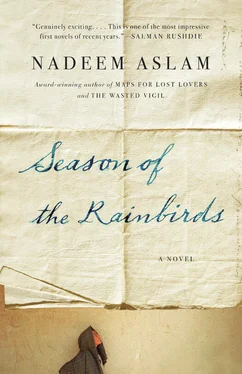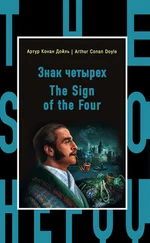Maulana Hafeez answered each question thoughtfully and precisely.
‘Myopia,’ the optician announced when he had finished the questioning. ‘It’s also called near-sightedness because things near the eye are less out of focus than those far away.’ Maulana Hafeez was nodding uncertainly. ‘It’s natural, Maulana-ji,’ the optician continued. He explained how, due to stiffening with age of certain muscles in the eye, almost everyone lost some ability to see distant objects; and how people who were far-sighted when young had near-perfect vision in their old age because the myopia of their later years counterbalanced, and therefore corrected, the earlier defect.
‘God’s wisdom is limitless,’ responded the cleric. The optician leaned forward in his chair towards Maulana Hafeez and began handing him pairs of glasses.
The blurred edges contracted all of a sudden and objects came sharply into focus — even those that he had thought of as simply too far away to be seen. Maulana Hafeez was taken aback — that others observed things with such clarity, that all the time he too had been meant to see the world as clearly as this.
‘This one is just right,’ Maulana Hafeez said, looking around and pointing up at the pair resting on his nose. He took them off and carefully folded down the arms. The vendor walked around the case, some of whose neat rows were now in disarray, and began to examine Maulana Hafeez’s eyes. Using a forefinger and thumb he exposed almost half of each eyeball and, holding his face inches away from Maulana Hafeez, shone a torch into each eye.
Maulana Hafeez had never seen another face so close to his own. He struggled to look away. ‘You didn’t have to come straightaway, you could have waited until it was cooler.’
‘There’s no problem, Maulana-ji,’ said the vendor. ‘You must provide us sinners with more chances to be of service to you.’
Maulana Hafeez did not hear him; he was not listening. ‘A terrible calamity,’ he said. ‘A tragedy. May he find a place in God’s paradise. God is the glorious truth.’
At last, the man stepped back. Maulana Hafeez straightened in his chair.
‘A terrible business,’ the vendor agreed. He had picked up the small wallet-like case in which the glasses would be stored when not in use. He was preoccupied with dusting it clean, paying especial attention to the area around the clasp. ‘This morning when I heard the announcement from …’ He broke off, looking disconcerted.
But Maulana Hafeez encouraged him to continue with a nod.
‘… from the other mosque, I went straight to the house to see if there was anything I could do, see if I could help with the arrangements.’ He placed the chosen spectacles in the wallet, added a square of yellow felt, and snapped shut the clasp.
Maulana Hafeez looked down into his lap. ‘It is true. I didn’t make the announcement till noon. I didn’t think there would be any need.’
The vendor accepted Maulana Hafeez’s money — after a flurry of refusals — and was ready to leave. But he lingered over the fastening of his case, and once the case was packed, seemed reluctant to pick it up. ‘Maulana-ji,’ he said finally, placing a hand on the cleric’s forearm. ‘There is a reason why I answered your message so quickly. I have to tell you.’
With a faint nod Maulana Hafeez motioned him to retake the seat he had just vacated.
‘Maulana-ji,’ the man began very quietly, ‘when this morning we went to the deputy commissioner’s house to give him a message from the police inspector, we saw a girl in his house.’
Maulana Hafeez remained silent for a few moments. He prepared his answer. ‘Are you sure? Because those who spread slander will be punished here on earth and in the Hereafter. Your own tongue will be called upon to testify against you, about the evil uses to which it was put.’
‘Maulana-ji, I saw her myself. We went inside and there she was, combing her hair, with a bottle of linseed oil by her side.’ With both forefingers he pointed to his eyes and added: ‘With these eyes, Maulana-ji.’
Maulana Hafeez lifted his beard. Again it was some time before he spoke. ‘I’ll look into it and see what can be done. Azhar is a very good man, there is bound to be an explanation. She was probably a servant.’ He rose from the chair, indicating that the exchange was over.
‘But in the meantime,’ he added, as they reached the front door, ‘I must ask you to be discreet. Do not mention this to anyone else.’
Back in his bedroom Maulana Hafeez placed the rosary next to the clock on the shelf and picked up the newspaper lying folded on the bed. Rain had pockmarked the paper and when it crackled it made a sound more crisp than usual. Maulana Hafeez read the newspaper methodically, beginning as always at the top of the front page and working his way down. Occasionally he had to turn to one of the inner pages to continue a front-page story; and this he did by carefully folding and refolding, and counting the columns with a forefinger until he reached the appropriate number. Some of the columns had a few blank spaces where stories of appropriate length had not been found to replace the censored items. Maulana Hafeez glanced at the advertisements and — it was Wednesday — read the children’s supplement. There was a photograph of a Japanese robot. Encased in gleaming chromium plates fastened together with rivets, the automaton had the appearance of a human male and could, the caption ran, function like a man.
Maulana Hafeez read until four attuned chimes from the clock in his wife’s room told him that soon it would be time for Asar — the third prayers of the day. The heat was beginning to subside. He washed himself with water from the clay pitcher in the bathroom and went into his wife’s room. The blinds were still closed and the light in the room was subdued. The woman was saying her rosary.
Maulana Hafeez walked over to the shelf and unscrewed the cap of the attar bottle. The smell of roses quickly spread to his wife’s side of the room. ‘Tell Mansoor to wait for me when he comes back for the newspaper,’ Maulana Hafeez said over his shoulder.
She lowered her beads into her lap. ‘He wanted to see you when he brought it over, Maulana-ji. He waited, said he had something to tell you.’ And in response to the puzzled look on her husband’s face she added: ‘It seems there was a woman in the deputy commissioner’s house last night.’
There was a silence from Maulana Hafeez. Then, ‘Who says so?’
The woman shook her head and shrugged.
Maulana Hafeez transferred the small circle of attar from the tip of his forefinger to his shirt. The cold water he had used for ablutions had comforted the skin on his arms, feet and face but his eyes had remained like two live coals embedded in his skull. ‘I’ve known about it since last week. I saw a woman going into the house at night and I knew a woman had no business going there, especially at night-time. Now I suppose I’ll have to talk to him.’ He set the attar bottle on the shelf and turned around. ‘But in any case I would like a word with Mansoor himself about the television he has brought into his house.’
‘Mansoor?’ the woman said. ‘He is not rich enough to afford a television, Maulana-ji.’
‘Precisely,’ Maulana Hafeez said, turning his head at an angle. ‘Doesn’t he realise that he is offending God if he has got himself into debt for something like this?’
‘How do you know he has one, Maulana-ji?’
‘There’s an antenna on the roof of his house,’ Maulana Hafeez said coolly. ‘I’ve just seen it from my window.’ And with that he reached into his pocket to show his wife his recent purchase.
Читать дальше












